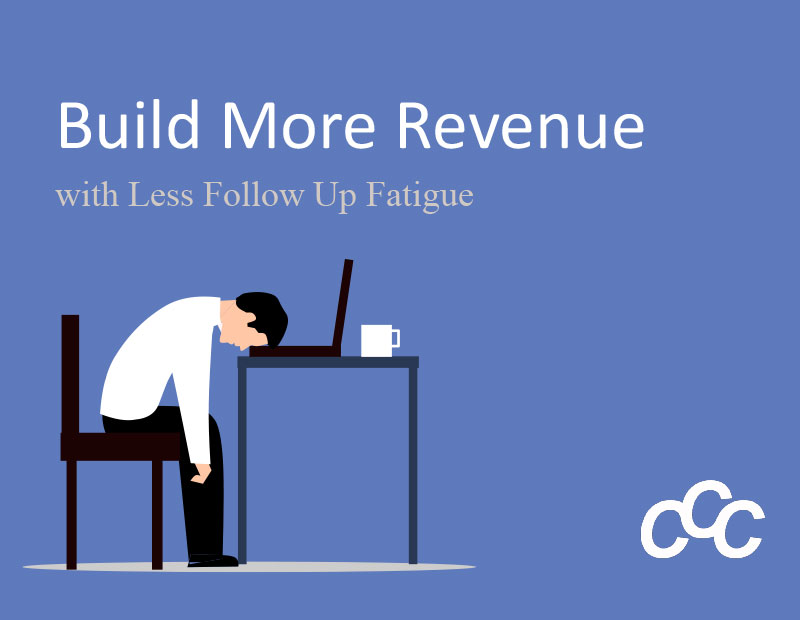Leads are coming in through different channels including your website and networking events. You need to increase the number of salespeople in your business so you can manage, nurture, and convert more leads into sales, so you start hiring. As you hire salespeople, you give them the run-down, hand over leads, and send them into the field. There is just one challenge. You are creating Follow Up Fatigue for yourself and your salespeople because you expect them to continuously check-in and update you. If they don’t, you follow up with them, and this is taking away valuable time for both of you.
There is an easy solution to this challenge. Use a CRM. Let’s look at 6 reasons a CRM can help you and your sales team sell more with less Follow Up Fatigue.
CRM keeps you up to date
As a business owner, how many have you have wondered about a client meeting that a sales team member had earlier in the day? You thought about reaching out since they did not “check in”, but it is 11 pm. You can look at the updated status of your salesperson in your CRM and run reports with real-time data. As you and your team make updates to lead follow-up and communication, you stay up to date without experiencing Follow Up Fatigue (and your salesperson can get a good night’s sleep).
CRM centralizes your data
When everyone is managing leads their own way, you are constantly asking for reports, a contact’s number, or a proposal for a project. Your sales team takes the time to provide the requested information, but it comes in different formats such as an email, an attached spreadsheet or document, or a printed copy. Keeping track is time-consuming.
Using a CRM as a central hub for client and prospect data helps you get access to specific information when you need it. Do you need a customer’s phone number? Do you need to review a draft proposal for a lead before it goes out? Do you need a report of all leads from your website month-to-date? You can retrieve all of this information without interrupting your sales team.
CRM keeps everyone accountable
How many times have you had a sales team meeting where tasks are assigned with the assurance they will get done? How many times do people come to the next meeting only to say they did not complete the task or follow-up because it was not in front of them?
With a CRM, you can create a culture of accountability. As you have your daily, weekly, or bi-weekly sales meeting, you can enter the assigned tasks for each person and set reminders to hold them accountable. A CRM takes the “out of sight, out of mind” excuse off the table, and you will find that your sales meetings are less stressful as tasks are completed…on time.
CRM gives you mobile access
When your sales team is in the field, they may need access to a document, proposal, or contact. If they are using spreadsheets to manage their contacts, leads, and updates, they need their computer. However, they may not always have their computer with them especially if they are in line at the coffeeshop waiting for their favorite iced white chocolate mocha. While they are waiting for their drink, their customer calls and asks for the latest numbers in the proposal before they step into a board meeting. Your salesperson can either tell the customer that they will get the numbers in 30 minutes when the salesperson is back at their desk, abandon their order and hurry back to their computer, or access their CRM from their smartphone and provide the customer with the numbers while in line for their iced white chocolate mocha. A CRM with mobile access allows salespeople to access customer data anytime, anywhere.
CRM lets you automate tasks
There are many tasks that are necessary, but redundant and time-consuming. For instance, if your sales team needs to send weekly or monthly reminders to their leads and customers, they can create a reminder in their Outlook to do the manual task. This can be frustrating when they get the reminder in the middle of a sales pitch or client call because now they have to remember the reminder.
With a CRM, your sales team can automate tasks that need to be done, rather than doing them manually. Automated tasks include a follow-up email after speaking with a lead or customer, sharing new offers, or reminders to renew a subscription or member service. Automation through a CRM increases lead conversion and customer retention while reducing the sales team’s Follow Up Fatigue.
CRM reduces the risk of duplication or misinformation
There are several reasons why you may have more than one salesperson managing a lead or customer’s account. It could be that one of them will be on vacation and the customer needs ongoing service or the customer is buying different products from different departments. Whatever the reason, if your salespeople are managing the contact and collecting information their own way, either something is going to get overlooked by one of them or they may have conflicting information for a proposal or client expectations. Either way, this is not good.
A CRM reduces the risk of duplication or misinformation because it is centralized. Each salesperson can see what the other is doing or what has been communicated to the client. When the salespeople are on the same page, the risk of duplication and misinformation is prevented, the customer is satisfied, and your company is viewed professionally.
Conclusion
A growing business is good. However, growing a business by increasing Follow Up Fatigue results in fewer sales with more effort. A CRM brings your sales team together and helps you grow your business by selling more with less effort. As an X2CRM partner, we help you implement X2CRM so your sales team can work together and help you meet your business goals. Contact us today to schedule a demo of X2CRM.





